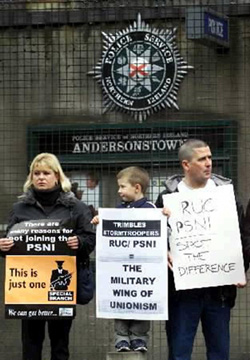22 April 2004 Edition
British political control is the problem with policing

Sinn Féin MLA Gerry Kelly was in New York on Wednesday to address the National Committee on American Foreign Policy (NCAFP) on the issue of policing in the North of Ireland.
His address comes on the heels of the public debate on policing in the US sparked by the Sinn Féin advertisement placed in the New York Times during the St Patrick's Day celebrations, and soon after an address to the same Committee by PSNI Chief Constable Hugh Orde.
The party's spokesperson on policing said: "In a way the recent report by Judge Cory into the killing of human rights lawyer Pat Finucane and the British Government response to this encapsulates the problem - British political control of policing."
He elaborated: "British political control of policing has brought collusion, killing, concealment and the prevention of due legal process in respect of wrongdoing by members of the British Army, their paramilitary police force and MI5. This is totally unacceptable."
He noted that "the political institutions set up by the Good Friday Agreement were to provide the essential political stability in which the issue of policing was to be resolved. The British Government has suspended these, and in breach of the Agreement, to appease unionism. As I speak, the political institutions have been suspended for a continuous period of almost 18 months. This is a serious political crisis which complicates the resolution of an already difficult issue."
Despite the difficulties, he said, Sinn Féin's "commitment to our peace strategy is as firm today as it ever was. That commitment is as applicable to the issue of policing as it is to the wider process. These issues are indivisible."
Kelly told his audience that "at our party conference in February I acknowledged that we have made significant progress in our efforts to achieve a new beginning to policing and justice. This is an achievable objective. I have told activists that republicans need to be acutely aware of that. We can succeed and we are mindful that with success comes responsibility.
"I believe that this is achievable. I believe that for the first time in history the potential exists to utterly change the unionist, paramilitary and sectarian character of policing in the North. We clearly have not yet reached that point but nevertheless significant advances have been made incrementally since the negotiations of 1998. I acknowledge that progress, but serious and central issues remain to be resolved if the new beginning is to be achieved. These include;
The continuing partisan political control of policing;
The continuing existence of the structures which implemented the policy of collusion between various British Government agencies and loyalist paramilitary organisations;
The need for a public independent international inquiry into the killing of human rights lawyer Pat Finucane;
The need to remove from the PSNI former members of the RUC, including the Special Branch, who were involved in state killings of citizens and responsible for other human rights abuses.
And, finally, there are a number of other issues which require resolution, including the use of lethal force in public order situations and the demilitarisation of policing."
He continued: "The fact is that the PSNI continues to act in a politically partisan manner. Key elements continue to wage a political campaign against Irish republicans. This manifests itself in politically loaded interventions. We recently witnessed the arrest of US citizen and Sinn Féin supporter Seán Mackin in Belfast in a blatant act of police intimidation connected, many suspect, to the recent Friends of Sinn Féin advert in the New York Times. Perhaps the most dramatic example of politresponsible for the brutal sectarian murder of James McMahon last November, despite knowing the identities of the UDA members involved. None of these people have been questioned, arrested or charged.
"So we have not yet achieved a new beginning.
"In fact, as a result of the investigation into collusion, by senior British police officer, John Stevens, cases were prepared against 20 police officers and British soldiers alleged to have colluded in the murder of nationalists. As part of the investigation team Hugh Orde knows the identities of these people. Some of them may now hold senior positions in the PSNI and the British Army. 14 months later, none of these 20 has been brought before the courts. What message does this send to the victims of collusion, their families and their communities? How do we respond to the families of those killed when they point out that, having investigated these crimes, Hugh Orde is now prepared to accept the presence of the perpetrators in his organisation?"
